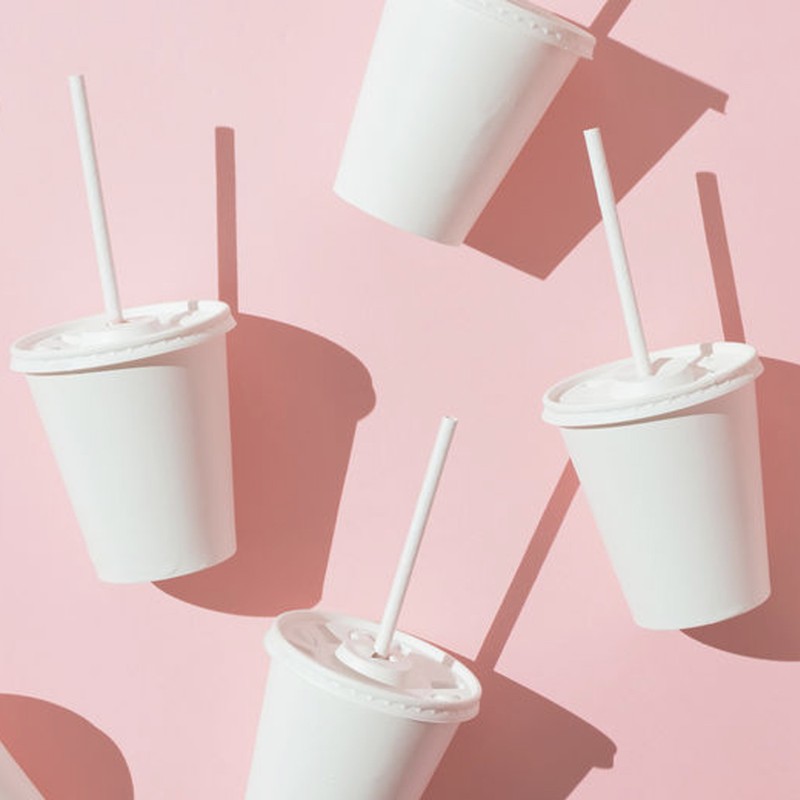6 Small Ways To Reduce Your Plastic Consumption
1. Carry A Canvas Bag
Every year the world uses 500 billion plastic bags with each one taking an average of 100 years to decompose. And that’s only if it’s exposed to sunlight and air - which landfill rubbish often isn’t - meaning that Sainsbury’s bag you just chucked in the bin, will probably outlive us all.
The simplest solution? Carrying a canvas bag. It’s both environmentally friendly and a stylish choice – Chanel, Balenciaga, Céline and Hermés have all made canvas tote designs, while £2.99 string grocery shoppers are a fashion crowd favourite.
Top tip: use two canvas bags if you’re shopping for raw meat and fish and keep them separate from other foods – especially fresh fruit and veg. Machine wash both regularly to prevent food poisoning.
2. Say No To Straws
Straws are the fifth most common item of rubbish – used for an average of 20 minutes, but taking up to 500 years to break down. Only a tiny fraction of plastic straws habitually given out with soft drinks, cocktails and iced coffee are recycled due to their small size; the majority end up in landfill, in rivers and, ultimately, the sea, where they seriously damage marine life.
The EU has proposed a total ban on plastic straws and cutlery, and many restaurants and bars have already switched to biodegradable options in a bid to help the environment. If plastic is the only option, say no, unless you absolutely need one. You can also dispose of it responsibly at a plastics processing yard such as Power Day powerday.co.uk
For at-home use, there are plenty of environmentally friendly options such as non-toxic, hard-wearing glass, stainless steel, bamboo and biodegradable paper.
3. Use A Reusable Coffee Cup
Only one in 400 coffee cups are recycled in the UK. Many can’t be reprocessed due to their inner plastic coating, designed to stop the liquid making the cardboard soggy. And with countless coffee shops now rewarding customers for bringing in their own reusable cups, there’s no excuse not to.
Starbucks offer customers with reusable cups 25p off their beverage, they also sell reusable cups for £1, and will soon begin to charge 5p more for takeaway paper cups; Pret, Costa and Paul give 50p off any hot drink; Greggs offer 20p off; Caffé Nero gives double loyalty stamps; and many more independent shops have their own discount schemes.
4. Drink Tap Water
Across the globe, we buy 1m plastic bottles every minute and each year 17m barrels of oil are used to produce them. Although the majority of plastic bottles are technically recyclable, most of them don’t get that far; in the UK just over half of the country’s plastic bottles are recycled.
Instead, invest in a reusable water bottle – we love Bkr’s hardwearing glass designs with stylish silicone cases. Download the Refill app, that lists free water bottle filling stations around the country. Costa and Premiere Inn are among the many businesses to have signed up.
If you’re a fan of fizzy water, consider investing in a SodaStream - yes, it’s back. Make as much carbonated water as you like without having to bin a single bottle.
5. Avoid Excess Packaging
From yoghurt pots to face wipes, almost everything under the sun comes in plastic packaging these days, and trying to reduce your plastic footprint completely can feel like an impossible task. To ease yourself into a plastic-free life, first focus on cutting your consumption of single-use plastic packaging – ditch multipacks, individually packaged items and microwave ready meals.
When shopping for fruit and veg, choose the loose options and skip the provided plastic bags (putting them straight in your reusable tote bag instead); opt for bar soap instead of liquid handwash; head to Lidl for plastic-free rice and couscous packaging; and Whole Foods Market for more loose store cupboard foods like nuts and muesli.
6. Join A Litter Cleanup Club
UN Environment has teamed up with Litterati, an app designed to eradicate litter, one piece at a time. From students in South Africa to activists in Italy, it’s become a worldwide community, over 100 countries strong, that’s crowdsource-cleaning the planet.
Not only does it make picking up rubbish fun - the app allows users to start or join ‘litter cleanup clubs’ in their local communities - it also analyses the data supplied by users to work with brands and organisations, to stop litter before it reaches the ground.
DISCLAIMER: We endeavour to always credit the correct original source of every image we use. If you think a credit may be incorrect, please contact us at info@sheerluxe.com.


